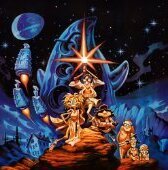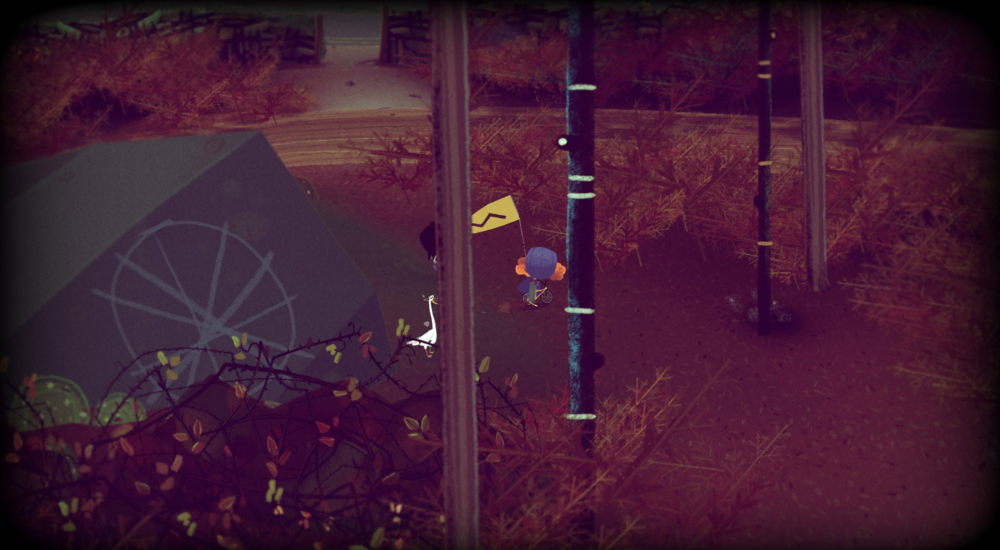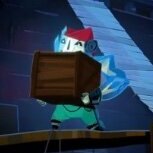Leaderboard
Popular Content
Showing content with the highest reputation on 04/28/22 in all areas
-
New version in the works: Better colors, higher detail. I've simply gotten better at cleaning these up over the years, so it could do with an update.5 points
-
Andy Kelly ignored my reply to that tweet, asking if he had secret news. So I'm taking that as a super-double-confirmation!3 points
-
I don't know that it was a particularly troubled development, in comparison with any other game he's made. Certainly the original Psychonauts, and Brutal Legend had a rather troubled development, they had to make lots of cuts from Full Throttle, and so forth. The main difference between Broken Age and those other games is that it was developed under public scrutiny, so things that would have happened in the dark and maybe talked about years later instead happened in the open. Like, let's say there'd never been a Kickstarter, but instead Tim got funding from a publisher to make Broken Age and it was announced at some point during development. Well, at the point where they started to realise they didn't have enough money to realise the whole vision, probably one of 3 things would have happened: 1) They ask the publisher for more money, they get it, and nobody ever hears or cares about that they had some budget issues. 2) They decide to make significant cuts to the game, and maybe people think it's a bit short, but by the time they release the game, whether they had to cut bits out would have been a matter of speculation and nothing more until they talk about what they cut years later (like Full Throttle) 3) Something like what they actually did, they decide to split the game and release it part 1 first, standalone. They're free to act like this was always the plan because they never announced otherwise, and they use the profits from it in order to fund the 'sequel'. I wonder if in any of those scenarios we'd really be thinking of Broken Age as having a 'troubled development' or if we'd just be thinking of it as a game (or two games) like any other that had its development ups and downs and eventually got released in some form. It's a bit like the situation with Psychonauts 2... people overemphasised in press chatter about it how long it was in development, but that development time was artificially inflated by 3 factors: 1) Because of the Fig funding, it was announced WAY before a game of this type would usually be announced, which made the development time feel much longer. 2) The Microsoft buyout bought them time and funds that they took advantage of 3) COVID slowing development for the second half. I guess what I'm saying is that a lot of this stuff has always felt like a bit of a false narrative generated by DF's relative openness compared with other devs. It says more about the stuff we DON'T see about other games, than it does about Broken Age, P2, etc. But... to address your question, I don't know. My sense from following DF closely for a number of years is that Tim isn't overly interested in revisiting the past. He'll dip into it with the remasters, and with Broken Age as an adventure game, and with Psychonauts 2, but all those had as much to do with keeping the company afloat as they did with what Tim wanted to do. I'm not saying they were cynical projects, but at some point it must have occured to the folks at DF that there's decent money in being able to capitalise on Tim's most beloved works, so it's a bit of a no brainer. But when you hear Tim talk about what he wants to do next, it's always something he's never tried before, and I think that's what he'll be drawn to especially now he knows he's not going to have to go round the world knocking on doors for money.3 points
-
The "Chris" by the way is Chris Purvis. He and Chuck Jordan were roughly the equivalent of Dave and Tim on the first game, in that they largely scripted and wrote the game's rooms.2 points
-
The Tweet states that someone named Chris identified the puzzles that could be skipped. So the way I read it, the game was built as Mega Monkey Mode and then toned down to 'normal' mode.2 points
-
Technically it's not "added", as it is already in the painting. Can't really remember, why I filtered it out so much in my old version.2 points
-
That's kind of funny considering that according to Jonathlan Ackley designing the difficulty modes took like a week: I never played CMI on easy though so I believe you.2 points
-
2 points
-
Well to be fair you most likely haven't seen any other 3D platforming staples since the early 2000s because the genre is quite dead. And sure, Nintendo is still making these games but they have the benefit of countless years of iteration and the fact that a Mario game can be even more abstract than a Psychonauts and when level design gets to be like that you won't really notice invisible walls and such. Double Fine on the other hand is kind of a jack of all trades, master of none developer were mechanical depth and polish usually takes a backseat to world building. It's not like how for example id Software is second to none at making FPS because that's the only thing they've done since the early 90s. I still remember how hard it was for me to get into playing Psychonauts after Prince of Persia The Sands of Time because gameplay wise Psychonauts was a huge step back but the writing and the insane world building still pulled me through. The same goes for Brütal Legend that is all things considered pretty bad at being a third person hack n slash / RTS hybrid (it definitely is better at the RTS though) but it has the most awesome and brütal world going for it. In a sense I think these shortcomings in gameplay design was what always made their bigger games not do that well. I've yet to play Psychonauts 2 but it's nice that I've only heard good things about it and it seems pretty obvious that the switch to Unreal (and maybe all that Microsoft QA) benefitted the game's technical quality.1 point
-
Just as a point of information, yes, Tim has said that if they had only gotten around the $400K mark they were planning on making a low-fi SCUMM/Flash-like adventure game. (Also, I should point out that the budget for FT was over $1mil in 1995 money, so at $300K - iirc they planned for 25% of the money to go on the doc - it wouldn't even have been in the FT range!) As for if Tim will make another PnC, I feel like maybe he might decide to do something interesting with them again, but it won't be for a good 5-10 years.1 point
-
On the topic of what I want, I think I'm more part inclined to want something that feels modern than a throwback, mainly because I don't really enjoy the perception of adventure games as a throwback genre. I think they can, and sometimes do, tell great, contemporary feeling stories now. And it was for that reason it's taken me a long time to play Thimbleweed Park. Firstly, the graphical style it's going for wasn't one I'm particularly nostalgic for (I like the look of the backgrounds but those MM style characters don't do much for me) and Secondly I was worried it was going to be so self-consciously a throwback that it would end up getting in its own way. I've played Thimbleweed for 4 hours at time of writing, and while I'm used to the art at this point, and actively enjoy aspects of the look, I do think parts of my second worry are at least partly true. It feels like it can't go five minutes without some sort of self-conscious joke about some aspect of adventure game mechanics, or some reference to the old days, and I... just don't find that sort of humour that engaging when it's overused. Monkey Island arguably had 3 'you can't die' jokes in its first 3 games (the falling off a cliff joke, I guess the falling into the acid pit joke, and the gravedigger's joke in CMI) but I've played this for 4 hours and there have already been 3 or 4 jokes on this theme. It was okay by the first time, but a little tedious by the 3rd time. It's so self-aware that I actually think it wraps back around to being not self aware about just how self aware it's being. And I am enjoying it, more than I thought I would, but with those caveats in place. If Tim or Ron or anyone else wants to make a throwback adventure game, my thought is by all means let 'em, but please, I beg you, constantly winking at the camera and saying, 'see, this is like what those old games were like' doesn't actually make it feel like the old games, it just reminds me of how far we are removed from them now. Personally, I'd rather they avoid the problem altogether and focus on making a great, modern game, with great characters and world building and puzzles, and trust the player to make the connection between this and what they made in the past all by themselves.1 point
-
I am going to preface this comment by confirming unequivocally that I adored Broken Age and would love Double Fine to make more adventure games if they want to. When Double Fine did their Tim Schafer Adventure Game kickstarter, I found out about it maybe 6-8 hours after it went live. As I'm sure you all remember, by that point it had already reached its funding goal and was well on its way to setting all kinds of records. It proved, immediately, that there was an appetite for adventure games. I remember thinking about that old infamous LucasArt's quote about "current marketplace realities" and sort of smugly thinking, "see? if you build it, they will come" - or in this case, if Tim Schafer asks us if we'd pay him up front for a new adventure game, the answer would be a three-million-dollar "YES". What we ended up getting from Double Fine, as others have said in this thread, was more than just an adventure game. We got a fully transparent production of an adventure game from inception through to release, and it was truly money well spent as a backer. I got plenty of goodies from my pledge level and in the end I also got an adventure game that I truly enjoyed. Tim Schafer took on the project from the position of a former-adventure game developer who was returning to the genre after a long gap, and wanted to modernise the experience. This was (and is) absolutely fine - just like Ron with Return to Monkey Island, I wanted Tim to make the game that TIM wanted to make. But a part of me felt like the kickstarter had really been about nostalgia, and wanting to revisit the LucasArts days. Had Tim decided to go down that road and make a game in the style of, say, Full Throttle, I'd also have been happy about it. (Actually, I wonder if that was the original intention now - a small low budget, SCUMM-style game. And then it only expanded into what it became because they got so much more money than they were asking for. I'm sure the answer is out there somewhere in an interview or on the documentary, but I guess it's irrelevant now.) What I'm meandering to here is that Thimbleweed Park felt like a conscious response to this. A similar kickstarter to the one Double Fine did, but this time explicitly with the intention of making a throwback, retro adventure game. As they put it at the time, they wanted it to feel like finding an old LucasArts game from the late 1980s in a drawer and realising you'd never actually played it. And I found myself being, for whatever internal reasons, massively more excited by the prospect of Thimbleweed Park than I was by Broken Age. Of course, Thimbleweed Park came and went, and I found it to be a really entertaining adventure game, just like Broken Age was, but it felt way closer to the early LucasArts games of my memory because it used retro graphics and had verb interfaces and all that stuff. It was truly a product for a person like ME, and I was really grateful for it. Now Ron Gilbert is working on his next adventure game, Return to Monkey Island, and we all know it isn't going to be a Thimbleweed Park. It's going to be a Broken Age. It's going to be Ron Gilbert consciously bringing his design sensibilities into 2022; the graphics will not be retro, there will not be a verb interface, and it will not feel like a game we found in a drawer and had forgotten about. And that's fine! But it has made me think about what I even WANT from these old LucasArts developers when they sit down and make new games for us. Do I want Thimbleweed Parks, or do I want Broken Ages? I have a natural tendency towards nostalgia, so it's little wonder I'm drawn more to the Thimbleweed Park style games. But of course, it's utterly unrealistic to expect those games now. It was frankly a miracle that we even got ONE more of them. And I'm not stupid enough to think that the old fashioned pixels and verb interfaces are inherently BETTER than any other way of playing adventure games. The fact of the matter is, I loved Broken Age, and I'm really excited for Return to Monkey Island - I couldn't care less what type of interface Ron thinks is right in this day and age, I just want to explore another world created by these game developers. So in answer to the question about Tim Schafer, I don't really think he's ever going to make another "point and click" adventure game again. But that's okay. Whatever he makes in the future, I'll be there to give it a try.1 point
-
Yep, that does make more sense. Doh. I stand corrected! Well this Chris chap did a good job. MI2 felt heavily edited by comparison, whereas Normal on CMI (which is how it’s described — rather than being an “Easy” mode) felt well designed and very deliberate.1 point
-
Yes, also my read. "He identified the puzzles which could be skipped." It would have taken way more than a couple of days to actually design and implement and write dialogue for whole new puzzles.1 point
-
Agh. Yep, I think you’re right. My bad. Strange because unlike MI2 it definitely feels like the other way around when you play it. With MI2 whole sections were pulled as I recall.1 point
-
YES!!!! Ha. That’s so true. It would get me every time, and I’d always feel like a satisfying conclusion when I finally got it.1 point
-
Personally I don’t think so. I think in the early LucasArts days, Tim was hampered by three things: A: his own lack of experience as a designer (although he had huge potential.) B: the fact that the only way to tell a decent story in video game form back then was an adventure game (and I think Tim is a storyteller at heart.) C: that LucasArts at that point mostly made adventure games (or Star Wars games) (not counting the occasional Afterlife or Outlaws). The moment he left LucasArts he immediately jumped to another genre with Psychonauts, and another with Brütal Legend. Now he’s a veteran game designer who can think out of the box way easier to come up with a gameplay style to suit the story he wants to tell. Not only that, but he’s turning 55 this year. I can imagine that being a turning point in thinking ‘what do I want to create with the time I have left’, and I doubt it’s going to be retreading a genre which he has fully exploited in the past already. Lastly, Double Fine was bought out by Microsoft. And even though they say they bought it with the intention of ‘letting them do their thing’, I’m sure if their thing was making another adventure game that wasn’t a sequel, there would be some serious questions to answer to. I hope so though! Another adventure game by Tim would be a dream come true!1 point
-
Welcome! Thanks for those thoughts and for sharing that Moriarty quote. So interesting! Glad I know which version to play should I ever revisit Loom again. They can have issues sometimes, but Psychonauts 2 was incredibly polished from beginning to end. They really pulled out all the stops!1 point
-
Yeah, if you can somehow get used to everyone looking like as if they have suffered some extreme and I mean extreme sunburns to the point that you'd want to donate to the nearest skin cancer foundation then you'll like Loom very much in EGA. Mark Ferrari's focus on dithering makes the image look interesting and it gives off an illusion of detail that is lost in VGA (even though VGA has all them colors).1 point
-
1 point
-
1 point
-
Jojo Jr. tells Guybrush that his father, Jojo Sr. , was swinging on the lever that controlled the Monkey Head switch after being trained to hang there (in MI1), but never recieved the command to let go, so he "starved to death, waiting for a simple command that never came!" Guybrush can also examine his grave later on but I don't remember if he had any particular quips about it there. As a side note, the monkey in MI1 that hangs on the switch is never named in-game, but in MI2, the piano playing monkey is actually named Jojo, and is unrelated to both Jojo Jr. and Sr. I guess all monkeys in this world are just naturally called Jojo!1 point
-
Thank you very much. I'm a longtime visitor, but actually a first-time poster. 🙂 Not that I'm an expert on this (far from it), but it is my understanding that LucasArts games as a whole were perceived this way back in the day, even within the industry. Not too long ago, I read a recent interview with a Sierra alumni (I think it was Josh Mandel), and he mentioned that Sierra staff used to be a bit jealous of LucasArts because of their no-expenses-spared, blockbuster-like approach. I also seem to remember reading (citation needed, though) that one of the reasons which led Blizzard to cancel the Warcraft adventure game was that, after seeing how technically impressive The Curse of Monkey Island was, they felt their own game felt too cheap by comparison. It's kind of crazy to think about it nowadays, but there was a very brief period in videogame history in which adventure games as a whole could not only go toe-to-toe with the "big guys", but were actually early adopters of many technologies. I mean, some of these adventure games had massive scripts which were fully voiced by professional voice actors (with very decent sound quality), in a time when other major franchises, belonging to other major genres, still only included some sporadic, barely-comprehensible synthesized voice samples. And didn't Creative bundle the CD version of The Secret of Monkey Island to promote one of their Sound Blaster cards? Anyway, more on topic: since we are discussing the prospect of a potential Loom remaster/sequel, I think this extract from a 2017 interview with Brian Moriarty might be of interest (it kind of relates to what I mentioned in my previous post, too):1 point
-
Hmm! I'd like to see character growth. Most of MI1's 'jerk guybrush' moments seem to come from him just being kind of oblivious to things outside of his immediate goals. In MI2, it's a bit different, it seems to come a bit more from an inflated sense of self-importance. I think after the experience of the tunnels and Big Whoop, however they actually get addressed, Guybrush's idea of where he fits in the world might have shifted again. Maybe we're going to see a more thoughtful, philosophical version of Guybrush, or something. Of course, we're talking shades here. It's still going to be the fairly inept but oddly determined character we know, trying his best to live up to the mighty pirate profession.1 point
-
Personally speaking, MI2 Guybrush always felt like a lot more of a jerk to me than MI1 Guybrush. I do wonder if this was due to the preponderating influence of Tim Schafer, since for much of MI2's development Dave Grossman was off working with Noah Falstein on an early version of The DIG.1 point
-
I definitely think that Thimbleweed Park was a way for Ron to work out some of his residual concepts from Maniac Mansion and the first two Monkey Island games, but I wouldn't say that I consider it a sequel. It certainly achieved its stated goal of feeling like a lost early LucasArts adventure game, at least for me personally. I really want to replay it, actually...1 point
-
Right 🙂 - but there are always these kinds of strange choices and mistakes in any programming - not least in SCUMM (Maniac Mansion, for example, has several different ways of waiting for actors to finish their dialogue, probably because things were implemented as they went along). There might have been a performance issue with fading just at that point, for whatever reason, and it might even have been fixed, but no-one remembered to change the code.1 point
-
elTee just said it, about the other dialogue. 🙂 It's definitely a bug - even though the Amiga only had the 32 colors (using the colors 16-48 in a 256 palette, with the rest unused), the intention was clearly to either: Not cut to black until Elaine was done talking (like the EGA version), or Cut to black, but keep Elaines talk colors so the sentence would be on black (like it is in the PC VGA version). Both could be done, either by: Putting wait-for-message before the cut, or Changing all colors (16-255) to black, then changing color 46-47 (the talk colors) to their actual colors - then wait-for-message. In pseudo-SCUMM without the choices between display mode, and with a totally made-up color-lightness command (which isn't what it would actually be called or look like, but something like it): say-line elaine "I hope LeChuck hasn't cast some horrible SPELL over him or anything." wait-for-message color-lightness of 16 to 255 is 0 ; only change colors to black when Elaine is done talking or say-line elaine "I hope LeChuck hasn't cast some horrible SPELL over him or anything." ... color-lightness of 16 to 255 is 0 color-lightness of 46 to 47 is 255 ; undo the blackness of those two colors wait-for-message ; NOW we wait for Elaine to stop talking - her dialogue will be visible on black background Instead, the wait is after the cut, and the talk colors are "fixed" after the wait. 🙂 The actual Amiga code: say-line elaine "I hope LeChuck hasn't cast some horrible SPELL over him or anything." ... color-lightness of 16 to 255 is 0 wait-for-message ; all colors are now black, and we wait for Elaine to stop talking ; another command here to deallocate the Elaine actor color-lightness of 46 to 47 is 255 ; now we change the colors of a dialogue line that's no longer displaying, hrm... See, it's close (although trying to do both things at once) - just the order that's wrong. Probably someone not quite remembering exactly what wait-for-message actually does, or when screen updates are done.1 point










